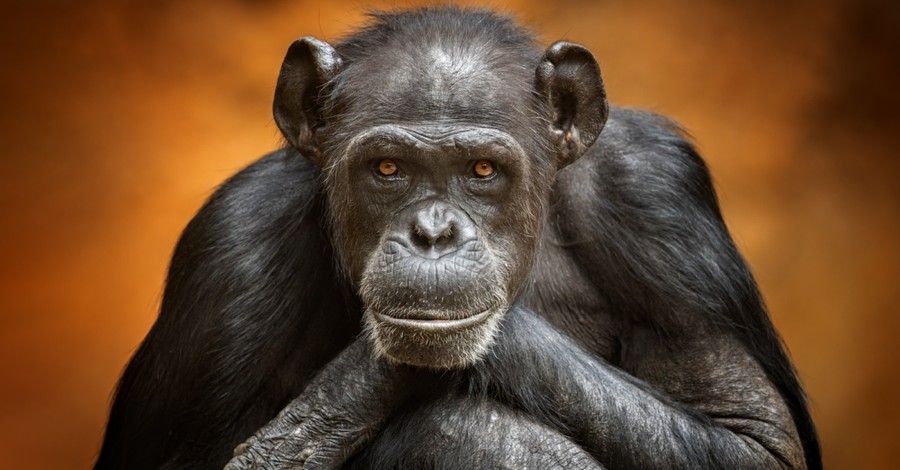
Certain ideas just won’t die, no matter how often and thoroughly they are debunked. Most of us have heard some scientist, journalist, teacher, or entertainer claim that “human beings and chimpanzees share 98-99% of our DNA.” That statistic is an example of what molecular biologist Jonathan Wells calls an “icon of evolution,” or Zombie Science. The often unstated implication of this undead statistic is that humans and chimps obviously evolved from a common ancestor, and that we are still, on a biological level, mostly the same.
There’s just one problem: The statistic isn’t true. In a recent discussion on The Discovery Institute’s ID the Future podcast, geologist Casey Luskin explained that the original “98-99%” figure was derived from a single protein-to-protein comparison before the chimp genome was sequenced. Since then, we’ve gained a great deal more precision.
According to Luskin, humans and chimps have about 35 million single base-pair genetic differences and five million insertion-deletion differences. Humans also have 689 unique genes not found in chimps. And while there are different ways of quantifying the differences, almost none of these ways yield the famous “98-99%” number.
For example, in 2018, Queen Mary University of London evolutionary geneticist Richard Buggs performed a one-to-one analysis of human and chimp nucleotides. He reported that “the percentage of nucleotides in the human genome that had one-to-one exact matches in the chimpanzee genome was 84.38%.”
Other methodologies have yielded numbers ranging from the mid-80s to 90s. Why the different results? Well, because as Luskin explains, it is not entirely clear how we should compare human and chimp genomes:
Are you comparing the number of genes or copies of genes that the organism has? Are you comparing one-to-one nucleotide similarities? Are you including just the protein-coding DNA or also the non-coding DNA? Are you looking at certain segments of the genome that aren’t even necessarily places where the sequence matters, like the centromeres…?
It turns out you’ll get a different answer depending on which method you choose. And there is an even deeper problem, says Luskin:
All of the chimp genomes we have today were effectively humanized.… The human genome was used as a scaffolding during the construction of these chimp genomes, which essentially makes the chimp genomes appear more similar to humans than they truly are.
None of this is new. Back in 2007, a paper in the journal Science admitted that the “1%” statistic was a myth and called for the truism to be retired. Yet 16 years later, this zombie idea shambles on, perpetuated by publications like Smithsonian Magazine, Nature, and the American Museum of Natural History website.
Why? Well, simply put, the “98-99%” myth holds great power in advancing the materialist worldview that dominates the hard sciences. Even if this pseudo-scientific meme were true, it is rarely stated or received as a mere fact. Instead, it is used to imply things about human beings: that we are the sum of our DNA; that we are, by that measure, almost 100% animal; and that therefore everything theologians once meant by “the image of God” is a self-flattering illusion. We’re not exceptional. We’re basically gussied-up monkeys.
But is that true? Well, the fact that humans share roughly 60% of our DNA with bananas should clue us in that there is much more behind what makes us us than just genes. As Luskin rightly notes, “There’s a vast cognitive and behavioral gulf” between humans and apes:
We’re the ones that write scientific papers about chimpanzees, not the other way around. We’re the ones that compose music, that create art, that build cathedrals, that use complex technology, that create religion and write symphonies.
Whether we are 99 or 84% similar to chimps genetically, there is clearly more going on than materialists can account for. The differences amount to a qualitative, not merely a quantitative, distinction between humans and animals.
And far from being slam-dunk evidence of common descent, genetic similarity is also what we would expect if we had a common designer—a creative intelligence who observed one of the cardinal rules of good engineering and programming by re-using his best designs and code.
So, the next time you hear someone repeat the claim that humans and chimps are virtually identical genetically, point out how fuzzy that number has become in light of recent science. And more importantly, point out that no reductive, material fact can account for why humans, and not apes, ask such questions in the first place.
This Breakpoint was co-authored by Shane Morris. For more resources to live like a Christian in this cultural moment, go to colsoncenter.org.
Publication date: March 13, 2023
Photo courtesy: ©Getty Images/Andyworks
The views expressed in this commentary do not necessarily reflect those of CrosswalkHeadlines.
BreakPoint is a program of the Colson Center for Christian Worldview. BreakPoint commentaries offer incisive content people can't find anywhere else; content that cuts through the fog of relativism and the news cycle with truth and compassion. Founded by Chuck Colson (1931 – 2012) in 1991 as a daily radio broadcast, BreakPoint provides a Christian perspective on today's news and trends. Today, you can get it in written and a variety of audio formats: on the web, the radio, or your favorite podcast app on the go.
John Stonestreet is President of the Colson Center for Christian Worldview, and radio host of BreakPoint, a daily national radio program providing thought-provoking commentaries on current events and life issues from a biblical worldview. John holds degrees from Trinity Evangelical Divinity School (IL) and Bryan College (TN), and is the co-author of Making Sense of Your World: A Biblical Worldview.











